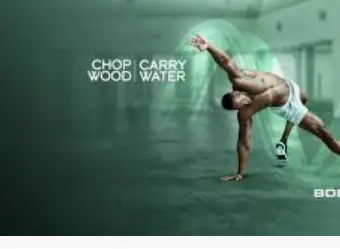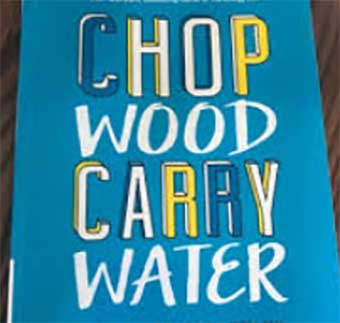If you’re chasing big goals but feel stuck in the grind, Chop Wood, Carry Water by Joshua Medcalf is a must-read. This book flipped my perspective on success, showing me how to love the process, not just the prize.
I’ll share my journey with this gem, its pros and cons, tips to apply its lessons, and how it stacks up against other self-help books. Trust me, it’s a game-changer for anyone wanting to grow—grab a copy and start transforming today!
My Experience With Chop Wood, Carry Water

A few months ago, I was burned out, chasing goals but feeling like I was running in circles. A friend recommended Chop Wood, Carry Water, promising it would shift how I see success.
Skeptical but curious, I dove in. The book follows John, a young man training to become a samurai archer under his mentor, Akira-sensei. Through short, parable-like chapters, it unpacks lessons about discipline, mindfulness, and embracing the daily grind.
I read it over two weeks, and it reshaped my mindset. Here’s how it went:
- Instant Engagement: The story format hooked me from page one. John’s journey felt relatable, like my own struggles with staying focused.
- Short Chapters: Each chapter is 3-5 pages, perfect for my busy schedule. I read one daily, reflecting on its lesson during my commute.
- Mindset Shift: By week one, I stopped obsessing over results. The book’s focus on process helped me enjoy small daily tasks.
- Practical Wisdom: Lessons like “focus on the present” stuck with me. I started applying them to work, making me more productive.
- Emotional Impact: John’s setbacks mirrored mine, making me feel less alone. Akira’s advice felt like a mentor talking directly to me.
- Reread Value: I’ve skimmed it twice since finishing. Each read reveals new insights, especially when I’m feeling stuck.
- Motivational Boost: The book pushed me to keep going, even on tough days. It was like a pep talk for my soul.
- Relatable Struggles: John’s doubts about his progress hit home. It reminded me to stop comparing myself to others.
- Actionable Advice: I started journaling my daily “chop wood, carry water” tasks. It kept me grounded and focused.
- Lasting Change: Two months later, I’m more patient and present. The book’s lessons are now part of my daily life.
This wasn’t just a book—it was a wake-up call to embrace the journey, not just the destination.
Pros Of Chop Wood, Carry Water

This book stands out in the crowded self-help space. Here’s why I loved it:
- Story-Driven: The fable format makes tough lessons feel approachable. John’s journey kept me hooked, unlike dry self-help texts.
- Short and Sweet: At 117 pages, it’s concise yet packed with wisdom. I could finish it without feeling overwhelmed.
- Practical Lessons: Each chapter offers clear, actionable advice. I applied tips like “surrender the outcome” to my work instantly.
- Universal Appeal: Whether you’re an athlete, student, or professional, the lessons fit any goal. I saw parallels in my career.
- Encourages Mindfulness: It taught me to focus on the present, reducing stress. I now tackle tasks one at a time.
- Relatable Characters: John and Akira feel real, not preachy. Their dynamic made the lessons feel personal and authentic.
- Rereadable: Its short chapters make it easy to revisit. I keep it on my nightstand for quick inspiration.
- Motivational Tone: The book’s optimism is contagious. It pushed me to keep going, even when progress felt slow.
- Growth Mindset Focus: It emphasizes effort over talent, which resonated with me. I stopped doubting my abilities.
- Affordable: The paperback and audiobook are reasonably priced. I got mine for under $15, a steal for its impact.
These strengths make Chop Wood, Carry Water a standout for anyone seeking growth without fluff.
Cons Of Chop Wood, Carry Water
No book is perfect, and this one has its flaws. Here’s what I noticed:
- Repetitive Formula: Each chapter follows a similar pattern—John messes up, Akira teaches, John learns. It felt predictable by the end.
- Simplistic Story: The samurai setting felt forced at times. I wondered why a modern kid was training as an archer.
- Not for Everyone: If you dislike parables, you might find it cheesy. I enjoyed it, but my friend called it “corny.”
- Limited Depth: Some lessons felt surface-level. I wanted more practical examples for complex life situations.
- Poor Narration: The audiobook’s narrator rushed and forced humor. I slowed it to 75% speed to enjoy it more.
- Typos in Print: My copy had minor grammatical errors, which distracted me. A cleaner edit would’ve helped.
- Overhyped Wisdom: Some lessons, like “avoid comparison,” aren’t new. I expected more unique insights.
- Cultural Disconnect: Akira’s modern slang (“work your butt off”) felt out of place for a samurai mentor. It broke immersion.
- Short Length: While concise, it left me wanting more depth. I wished for a few longer chapters.
- Niche Appeal: Athletes may love it, but others might struggle to connect. I had to stretch to apply some lessons.
These issues didn’t ruin the book for me, but they’re worth considering before you buy.
Also read:My Final Thoughts Waterboss Proplus 380
Chop Wood, Carry Water Vs. Other Books
I compared Chop Wood, Carry Water to other self-help books like The Power of Now, Atomic Habits, and Mindset. Here’s how it holds up:
- Chop Wood, Carry Water Vs. The Power of Now:
- Chop Wood uses a story to teach mindfulness; The Power of Now is more philosophical and dense.
- The Power of Now dives deeper into spirituality, while Chop Wood keeps it practical and action-focused.
- Chop Wood is shorter (117 pages vs. 200+), making it quicker to read and apply.
- The Power of Now lacks a narrative, which made Chop Wood more engaging for me.
- Chop Wood focuses on daily tasks; The Power of Now emphasizes mental presence over action.
- The Power of Now felt abstract at times; Chop Wood gave me clear steps to follow.
- Chop Wood is better for beginners; The Power of Now suits those ready for deeper reflection.
- The Power of Now has broader appeal, while Chop Wood resonates most with goal-driven folks.
- Chop Wood won for its storytelling and brevity in my experience.
- I preferred Chop Wood for its practical, relatable approach.
- Chop Wood, Carry Water Vs. Atomic Habits:
- Atomic Habits focuses on building systems; Chop Wood emphasizes mindset and process love.
- Chop Wood uses a parable, while Atomic Habits relies on research and examples, which felt more scientific.
- Atomic Habits is longer (300+ pages) but offers detailed strategies; Chop Wood is concise but less tactical.
- Chop Wood inspired me emotionally; Atomic Habits gave me a clearer roadmap for habit-building.
- Atomic Habits is universal, while Chop Wood feels tailored to athletes or dream-chasers.
- Chop Wood’s story made lessons stickier; Atomic Habits was more structured but less fun.
- Atomic Habits has more data-driven advice; Chop Wood leans on motivational storytelling.
- Chop Wood is cheaper and quicker to read, which I appreciated.
- Atomic Habits helped me plan better, but Chop Wood motivated me more.
- Chop Wood edged out for its emotional impact and simplicity.
- Chop Wood, Carry Water Vs. Mindset:
- Mindset explores fixed vs. growth mindsets; Chop Wood applies growth mindset to daily tasks.
- Chop Wood’s story format was more engaging than Mindset’s academic tone.
- Mindset uses research and case studies; Chop Wood relies on a fictional narrative.
- Chop Wood is shorter and easier to digest; Mindset felt denser and more theoretical.
- Mindset offers broader psychological insights; Chop Wood focuses on practical daily effort.
- Chop Wood resonated with my goal-oriented side; Mindset appealed to my analytical side.
- Mindset is pricier and longer; Chop Wood is affordable and quick.
- Chop Wood’s lessons felt more immediate; Mindset took longer to sink in.
- Mindset is great for theory lovers; Chop Wood suits those who want inspiration.
- I chose Chop Wood for its motivational storytelling over Mindset’s depth.
Chop Wood, Carry Water shines for its brevity and heart, though it’s less detailed than competitors. It’s perfect if you want inspiration over analysis.
Maintenance And How To Get Chop Wood, Carry Water

To truly benefit from this book, you need to live its lessons. Here’s how I applied them and how you can too:
- Read Actively: Highlight key quotes and journal how they apply to your life. I noted Akira’s advice daily to stay focused.
- Set Small Goals: Focus on one “chop wood, carry water” task daily, like writing 500 words. It built my discipline.
- Reflect Regularly: Spend 5 minutes nightly reviewing your progress. I used a gratitude journal to track small wins.
- Avoid Comparison: Stop measuring yourself against others. I unfollowed social media accounts that sparked envy.
- Reread Often: Skim a chapter weekly to refresh the lessons. It keeps me grounded when I’m impatient.
- Surround Yourself Wisely: Hang out with positive, driven people. I joined a book club to discuss growth ideas.
- Practice Mindfulness: Do one task fully present each day. I started eating meals without my phone, savoring the moment.
- Embrace Setbacks: View failures as learning opportunities. When a project flopped, I focused on what I learned.
- Stay Consistent: Commit to daily effort, even when it’s boring. I wrote every morning, even on tough days.
- Share the Lessons: Teach a friend one principle, like process over outcome. It reinforced my own understanding.
These steps turned the book’s wisdom into real change for me. Try them to make it stick.
Also read:My Final Thoughts Waterboss 900
Frequently Asked Questions (FAQ)
The core lesson is to embrace the process over the outcome. Success comes from consistent, mindful effort in daily tasks, not chasing quick results. It teaches you to find joy in the grind and grow through discipline.
No, it’s a fictional parable. Joshua Medcalf uses the story of John and Akira to convey life lessons, not a real event. The narrative draws on Zen principles but isn’t based on a true story.
It’s a Zen proverb meaning greatness comes from consistent, humble effort. Chopping wood and carrying water symbolize daily tasks done mindfully, leading to mastery and fulfillment over time.
The book doesn’t prescribe a timeline, but I read it in two weeks, one chapter daily. You can adjust based on your pace—its short chapters make it flexible for any schedule.
Conclusion
Chop Wood, Carry Water transformed how I approach my goals, and it can do the same for you.
Its simple, powerful lessons helped me find joy in the daily grind, stay present, and ditch comparison.
It’s not perfect, but its wisdom is worth your time.
Grab a copy, apply its principles, and watch your mindset shift—you’ll be glad you did!
